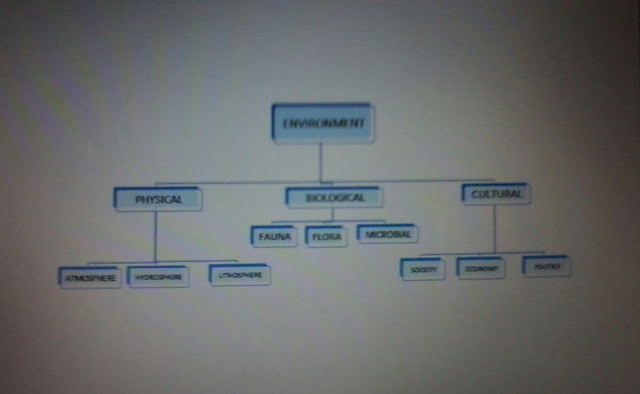I have done posts on the
definition and structure of the natural environment before. With this post I
intend looking at the engineering of the natural environment from a broader
perspective. There are varied concepts on the subject. The traditional concept
is that the natural environment is composed of three components namely air,
water and land.
DEFINITION
Let us get some definitions of the term
natural environment or environment as a way of determining the scope of the
topic.
1) The totality of all the external conditions affecting
the life, development and survival of an organism.
UNITED
NATIONS
2) Conditions that surround and influence an organism or
community.
NATIONAL GEOGRAPHIC
3) Environment literally means surrounding and everything
that affect an organism during its lifetime is collectively known as its
environment. In another words “Environment is sum total of water, air and land
interrelationships among themselves and also with the human being, other living
organisms and property”.
NEW
AGE INTERNATIONAL
ANALYSIS
From the foregoing definitions I deduce that there are
three components. They are that which is surrounded- organism, that which
surrounds- external conditions and chemistry between that which is surrounded
and that which surrounds.
THAT WHICH IS SURROUNDED: The organism takes the center
stage in the definition of the word environment. All that is around a
particular organism, apart from that particular organism itself, and is
subjective to its growth, interactively or through influence is environment. So
the organism must draw something from or exchange something with that which
surrounds them. What then is organism? Organism is a living thing. Forms of
organism are humans, animals, plants, fungus and microbial. When an organism
affect the growth of another organism, that organism is then part of the
environment.
THAT WHICH SURROUNDS: These surroundings or external
conditions are air, water, land, organisms, temperature, weather, economy,
society, politics, internet, Facebook, Twitter, Google plus etc. Though social
media is a tool of communication it is impersonal. One who is not a Muslim if
converted to Islam through its teachings, that person gets affected by that
environment.
CHEMISTRY
BETWEEN THAT WHICH IS SURROUNDED AND THAT WHICH SURROUNDS: The
term ‘influence/affecting the life, development and survival of the organism’
shows dependence of the organism on that which surrounds it for growth. That
which is around the organism must interconnect with and affect its growth,
development and survival to be environment.
In the
British concept, the environment splits into two- biotic and abiotic. The
biotic relates to living things, and the abiotic relates to the nonliving.
Living things are animals and plants, and nonliving things are air, water, land
etc. The biotic splits further into three. The three are producers, consumers
and decomposers. Producers are plants, through photosynthesis they produce
food. Consumers are animals that eat food produced by plants. Decomposers are
for example, fungi and bacteria that breakdown dead matter into simpler forms. The
abiotic too splits further into two. The two are climate and edaphic. Climate
is clear. Edaphic pertains to land.
In the
American concept, the environment is divided into five spheres or areas. The
spheres are the atmosphere, the hydrosphere, the biosphere, the lithosphere and
the anthrosphere. The atmosphere deals with the air. The hydrosphere deals with
water. The biosphere deals with plants and animals. The lithosphere deals with
the crust of the earth and a layer beneath it. The anthrosphere deals with
human activities in the environment.
PARTING SHOT
Anthrosphere, as said deals with human activities in the
environment. When compared with other creatures we humans consume more
resources from the environment. The other creatures do it in a way so as to
clinch a clean and balanced environment. Is that the way we do it?
The theme for this year’s (June 5, 2016) World Environment
Day is “Go Wild for Life”. The focus is the illegal killing of wildlife by
humans for its products, driving some species to the brink of extinction. That
human activity results in imbalance in the ecosystem. Let us juxtapose our
activities in the environment to its cleanliness and balance for our own good.
Let me end with a Mohammed Ali quote: “Don’t count the
days, make the days count”.
Reference:
http://www.newagepublishers.com/samplechapter/001773.pdf



Comments
Post a Comment